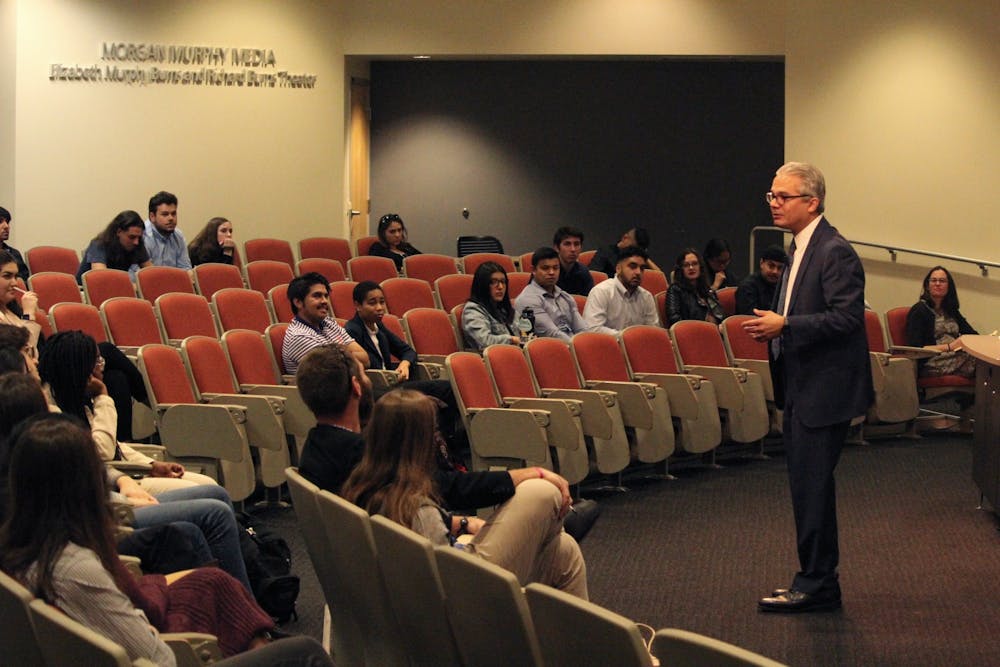During the past two weeks, four candidates vying for the position of dean of the Walter Cronkite School of Journalism and Mass Communication have visited with students and faculty, making cases for themselves and their plan for the school's future.
Each candidate gave "vision presentations" to current administration about their hopes for the future of Cronkite, met with faculty, answered student questions and toured the school's facilities.
Founding Dean Christopher Callahan announced in November that he would leave the school at the end of the academic year to become the next president of the University of the Pacific in Stockton, California.
After each candidate visits with students, "an email goes out from the Provost's office ... asking for feedback," Kristin Gilger, Cronkite senior associate dean, said in an email.
"The Provost will make the final decision, in consultation with President Michael Crow," Gilger added, and that the decision will be made in the next few weeks.
Rafael Lorente
Rafael Lorente visited Cronkite on Jan. 28. Lorente is currently an associate dean for academic affairs and the director of the master's program at the Philip Merrill College of Journalism at the University of Maryland.
"I believe in journalism programs as being experiential," Lorente said. "I believe that you should be failing while you're here. I believe we need to be collaborative and interdisciplinary."
Students responded to his emphasis on learning from failure positively, after having experienced the difficulties in the field of journalism.
"That premise is going to help a lot of students ease into the profession," Patricia Vicente, a junior studying sports journalism, said.
Lorente mentioned past projects such as working with NPR in order to make a larger impact than his school could have done on their own.
"(UMD is) very careful about looking for partners and looking for ways to leverage what we do to make ourselves bigger than we are," Lorente said. "If we apply that lesson at this big school, maybe this school's footprint can be even bigger."
Diversity, something that connected more emotionally to students, was another aspect of the discussion. If selected, Lorente would be the Cronkite School's first dean of color, coming from a bilingual, immigrant family.
"When I first came here, I felt culture shock a lot because there weren't many people of color, or at least that I knew here," Vicente said. "I think it would be a big step up for the diversity that Cronkite is trying to get."
Other Cronkite faculty, including Dean Callahan and the Director of Washington Operations Steve Crane have held an associate dean and assistant dean position at UMD's journalism school, respectively.
Mark Lodato
On Jan. 31, the next candidate for the position of dean was a familiar face, Mark Lodato, who has been with the Cronkite School since 2006 and is one of the school's current associate deans.
Lodato discussed improving and refining the current programs that the Cronkite School offers.
A recurring focus was expanding pathways for students, ranging from adding more diversified classes, growing the school's professional programs and branching out both across the nation and the world to offer students more experiences.
“I want to expand our boundaries even further,” Lodato said. “There is a desire for Cronkite to be the nation's journalism school."
He added further that no one who replaces the founding Dean Callahan, will “fill his shoes” but rather do what they think is best for the school.
“We have the ASU charter right outside the building that talks about helping students succeed, working within our communities to help our community,” Lodato said. “So to me, that's growing the best of what we are.”
Students, like Vicente, noted that Lodato was the only dean candidate who took notes while students were asking questions and sharing their concerns about the future.
Another point of Lodato's was to expand the feeling of community within the school and allow not just for diversity, but for inclusion, stating that students should “feel at home” at the school.
Conor McGill, a freshman studying sports journalism, said that one of the things that Dean Callahan did that stood out to him was inviting out-of-state students to his house for Thanksgiving.
"I would like to see more student engagement," McGill said. '"I would love to see this new dean interact with the bureaus more and (be) open for forums and office hours."
Sonya Forte Duhé
The third candidate, Sonya Forte Duhé, is the current director and a professor in the School of Communication and Design at Loyola University in New Orleans. Her background is in television news reporting and she has previously worked in the communications department at the University of South Carolina.
Duhé discussed her background in utilizing multimedia and told students about the ways that programs at Loyola have been created to service public relations, broadcast and print journalism students.
"If we're going to do something, we're going to be the best at it," Duhé said.
After emphasizing study abroad opportunities, experience before education and equality in programs, students voiced their concerns about the future of the public relations program, sharing that they feel that the faculty and their peers do not treat them fairly.
"We have to treat everyone fairly," Duhé said. "That doesn't mean that we emphasize something less, it just means that we have to reassess the smaller issues."
Aspen Stanton, a senior studying journalism, said she was impressed with Duhé's potential to equalize the college culture.
"Every part of journalism is equally important," Stanton said.
Students also shared that the quality of some equipment at the Cronkite School is not up to professional standards.
"Good technology is a priority," Duhé said.
Misinformation and the trends in fake news were addressed by all of the candidates and are among the worries of students.
"We have to make sure that our students get the basics" to prevent journalists from contributing to the problem. Duhé said that even though she is no longer a reporter, everything she does has to stand up to journalistic standards.
Katherine Green
The final candidate, Katherine Green, is the current president of Shyft Media. Green began her presentation with her real-world experience inside the industry with CNN Worldwide and Tribune Media.
Green took student questions on topics ranging from diversity at Cronkite, more international opportunities for students and giving an opportunity to both make money and gain experience.
"The more things change the better it feels for me," Green said. "I don't want things to be stagnant."
Green emphasized the importance of crossing paths with other groups, focusing on a more grounded and overlapping education to create students with "jack-of-all-trade knowledge."
Creating relationships with other countries and places only helps journalism grow and flourish, Green said.
Paulina Verbera, a graduate student studying journalism, said she appreciated Green's knowledge of networking.
Verbera said that Green's eagerness to help students secure paid apprenticeships while in school is something she's never seen faculty speak on before.
"I don't need a legacy at Cronkite, I would love for Cronkite to have a legacy," Green said.
No matter who takes the position next, students seem sad to see Callahan go but are excited for the future of Cronkite.
"Cronkite is one of the best," McGill said. "I'm hoping the next dean will grow the school into something greater."
Reach the reporters at pjhanse1@asu.edu, wmyskow@asu.edu or tplach@asu.edu and follow @piperjhansen, @wmyskow and @TaliahPlach on Twitter.
Like The State Press on Facebook and follow @statepress on Twitter.

Wyatt Myskow is the project manager at The State Press, where he oversees enterprise stories for the publication. He also works at The Arizona Republic, where he covers the cities of Peoria and Surprise.

Piper Hansen is the digital editor-in-chief at The State Press, overseeing all digital content. Joining SP in Spring 2020, she has covered student government, housing and COVID-19. She has previously written about state politics for The Arizona Republic and the Arizona Capitol Times and covers social justice for Cronkite News.




